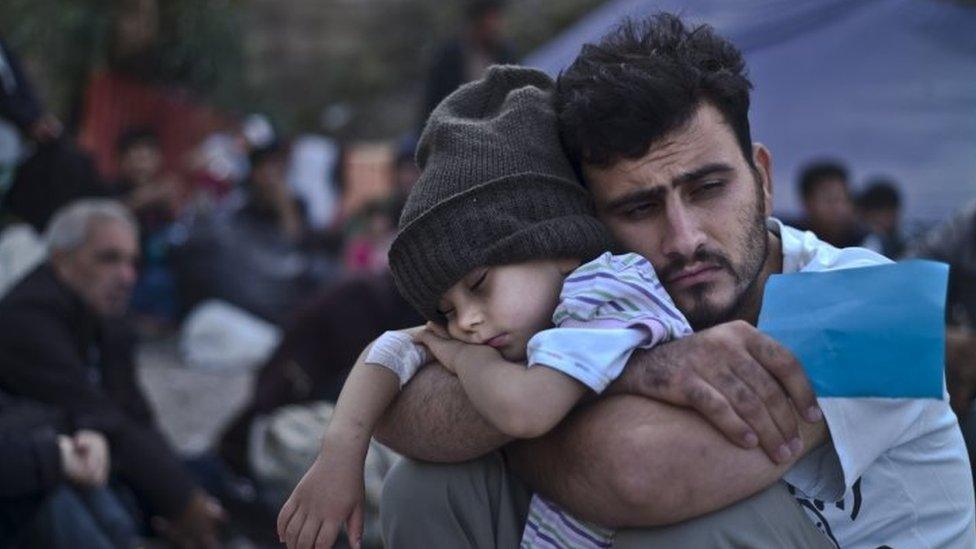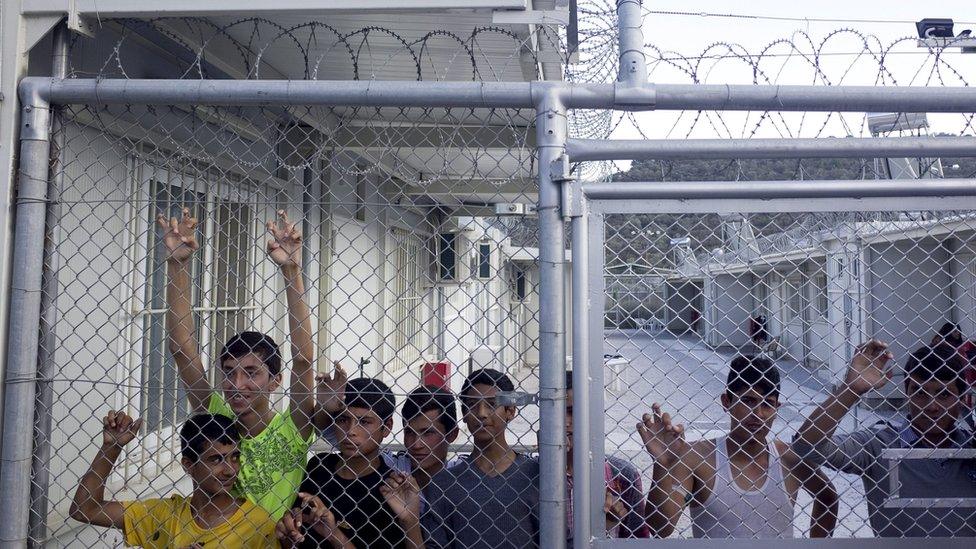Migrant crisis: EU plan offers more money for Turkey camps
- Published

Many Syrian migrants cross into Turkey before heading to the European Union
The EU is offering new incentives to Turkey - including financial aid and easing of visa restrictions - for help to solve the migrant crisis.
The European Commission said it would also "strengthen its capacity to combat migrant smuggling" off Turkey's coast.
The draft action plan is yet to be accepted by Turkey. It does not address some the demands made by its president.
Turkey says millions more refugees could flee the conflict in Syria due to Russian and Iranian involvement.
European Council President Donald Tusk said earlier that, according to Ankara's estimates, three million more people could head to Europe from Aleppo and the surrounding area.
But the International Organization for Migration (IOM) says it has so far had no reports of more people leaving Syria, and that Mr Tusk's comments were "speculative".
In Brussels, Turkish President Recep Tayyip Erdogan and EU leaders agreed to finalise an action plan with Turkey in the coming days to deal with the refugee crisis.
The draft document includes, external proposals for the EU to:
Provide up to €1bn (£0.74bn) for this year and next to help Turkey cope with refugees from Syria and Iraq
Resettlement of some refugees already in Turkey
Reinforce the Turkish coast guard to help it tackle smugglers
Build on plans for lifting visa requirements for Turks travelling to the EU
In exchange, Turkey would undertake various measures including implementing asylum procedures and giving priority to "the opening of the six refugee reception centres built with the EU co-funding".
'We need Turkey'
European Commission chief Jean-Claude Juncker earlier hailed Turkey for having admitted 2.2 million Syrian refugees.
"It is clear that we need Turkey. The Commission will come to its aid," he said.
However, Turkish Economy Minister Nihat Zeybekci was sceptical about the plan, according to Reuters.
His country would welcome a financial contribution from the EU to ease the strain of hosting migrants, but that funding would "not be a solution" to the crisis, Mr Zeybekci was quoted as saying.

Hundreds of thousands of people have made the journey to Europe via Turkey to Greece
The draft document published on Tuesday does not address demands made by President Erdogan for the creation of a safe haven and no-fly zone around Syria's northern border. Nor does it explicitly mention his calls for Turkey's EU membership process to move ahead more quickly.
In other developments:
Austrian Chancellor Werner Faymann visited the Greek island of Lesbos to see the impact of the migrant crisis on one of the main entry points to the EU
UK Home Secretary Theresa May said Britain did not need immigration in the hundreds of thousands every year because it made building a cohesive society impossible
Nearly 100 migrants are reported to have died in the Mediterranean off Libya since Sunday, the IOM says, citing unconfirmed reports from the Libyan Red Crescent
The IOM said the EU must tackle the people-trafficking gangs in Europe - not just intercept traffickers' boats
The body of a man - believed to be from Eritrea - was found after a fire broke out on Monday in a shelter for asylum seekers in eastern Germany, reports say
Can Turkey help solve EU migrant crisis?
What is the next route through Europe?
How is migrant crisis dividing EU countries?
EU migration: Crisis in graphics
Russia began its air strikes in Syria on 30 September, saying it was targeting Islamic State (IS) militants at the request of President Bashar al-Assad's government.
The West says Russia is also hitting non-IS rebels - a claim denied by the Kremlin. There have been reports that a number of Syrian civilians have been killed in the Russian strikes.
Hundreds of thousands of migrants - many of them fleeing conflicts in the Middle East and North Africa - have already arrived in the EU this year, many via Turkey and Greece.
Last month, the 28-member EU agreed plans to relocate 120,000 migrants over the next two years.

A note on terminology: The BBC uses the term migrant to refer to all people on the move who have yet to complete the legal process of claiming asylum. This group includes people fleeing war-torn countries such as Syria, who are likely to be granted refugee status, as well as people who are seeking jobs and better lives, who governments are likely to rule are economic migrants.